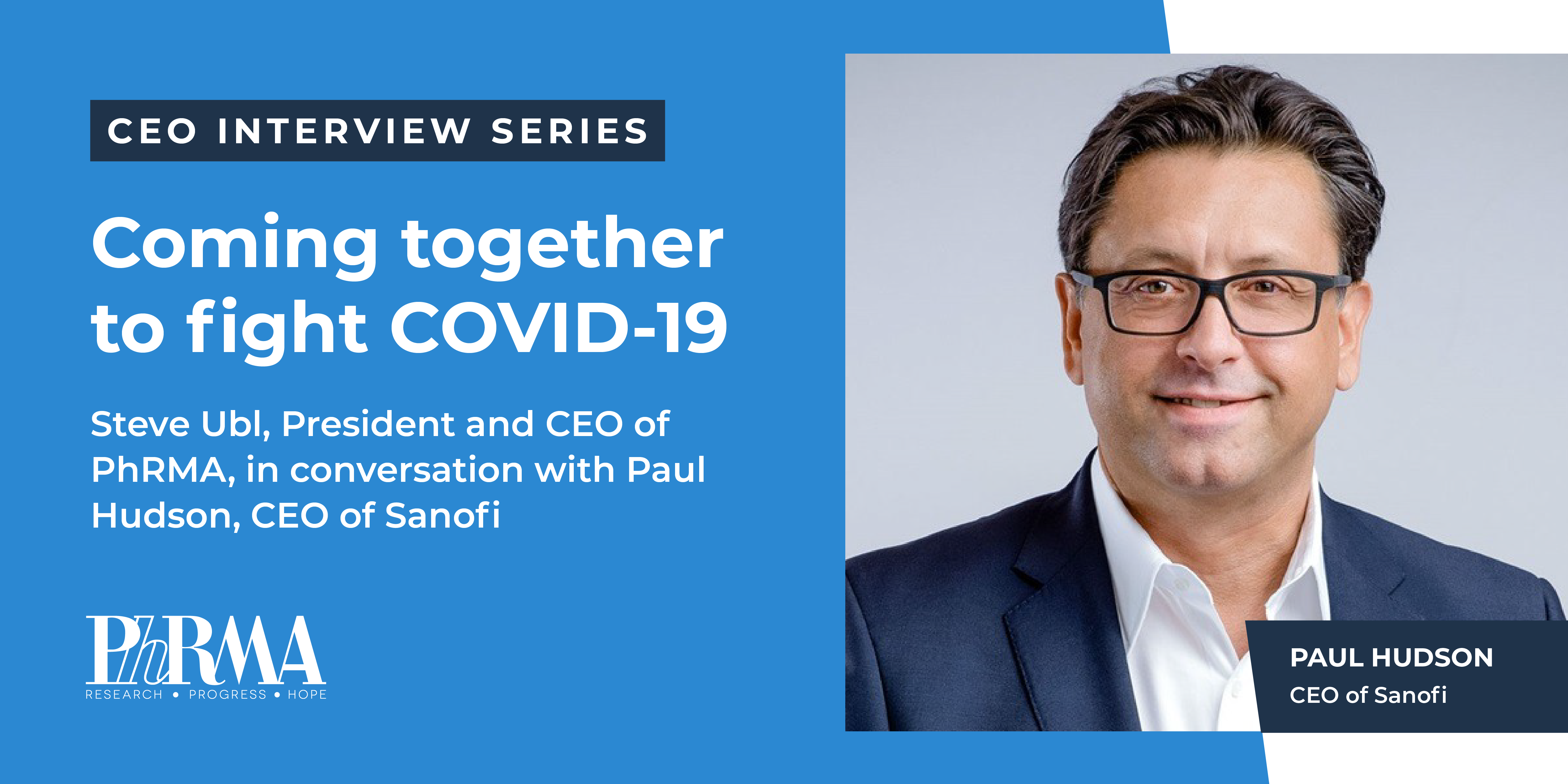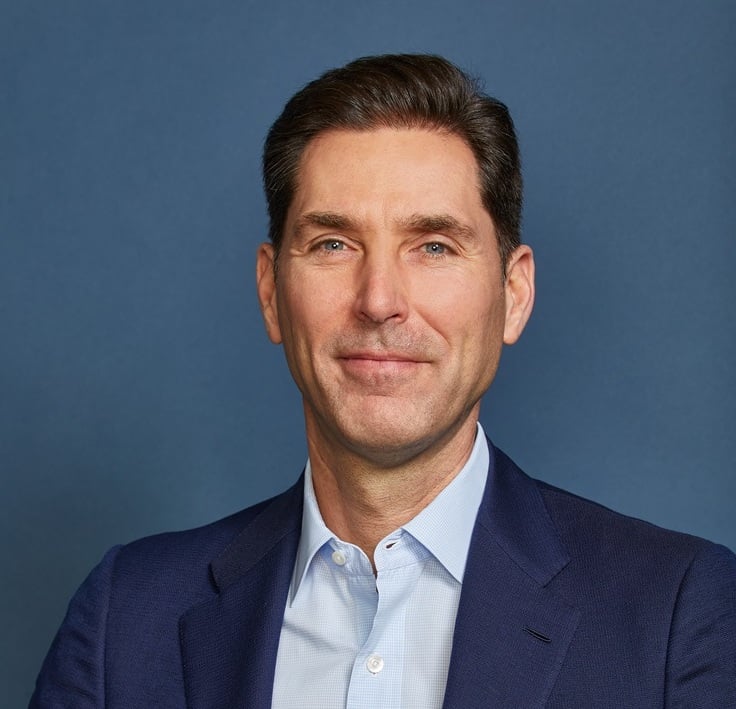![PH-1174x792px[1]](/-/media/Project/PhRMA/PhRMA-Org/HubspotImages/hubfs/464546/PH-1174x792px-1.jpg) Over the last seven months, our industry has been working around the clock to combat the COVID-19 virus, including developing effective therapeutics to treat COVID-19 and vaccines to prevent future infections.
Over the last seven months, our industry has been working around the clock to combat the COVID-19 virus, including developing effective therapeutics to treat COVID-19 and vaccines to prevent future infections.
I had the opportunity to connect with Paul Hudson, CEO of Sanofi, about the fight against COVID-19.
Stephen Ubl (SU): Paul, pleasure to have you, thanks for taking the time. I know you’ve talked with frontline workers at Sanofi. Can you tell me a bit about that experience?
Paul Hudson (PH): Thank you, Stephen. Like so many others, I have been at home the past few months. And perhaps like you, with teenage children at home, I have been competing for the WiFi!
But I have been able to get to our distribution sites a few times. One visit was early in March, as the initial impact of the pandemic was hitting Europe; the team was there, social distancing, and debating how to cover the weekend shift during that difficult time. The site leader asked for volunteers and, without hesitation, every single hand went up. It showed that our people understand the important role we had to play at a time of real need for society. If not us, who steps forward and works with frontline health care workers to do something so needed and meaningful?
This wasn’t an isolated incident. A couple months later, I was at a manufacturing site and met Juliana. She told me that though she’d been with Sanofi a long time, but only four weeks in manufacturing. As it turns out, Juliana works as an assistant to one of our teams and had specifically asked to help on the manufacturing line. She was retrained because she wanted to contribute. Juliana is amazing. Every company has similar stories of employees going above and beyond. Just incredible dedication and selflessness from people trying to step forward and do the right things at the most difficult times.
SU: It has been uplifting to watch everyone work together these past few months. What comes to mind is the partnership Sanofi formed with GSK. Can you tell me more about your vaccine candidates and why this partnership is so critical?
PH: We have two strong candidates, one of which is the only vaccine in the race that is on a platform that is proven to work at scale. This is an exciting and promising prospect and to give it the best chance of working, we came together with GSK. We are leveraging our experience and expertise with the influenza vaccine, and they bring their proprietary adjuvants to make it as effective as possible.
A partnership like this should’ve taken a year to come together. We did it in 12 days. It’s really incredible and we are pushing all our chips on the table to make it happen.
But, ultimately, this is a race we are absolutely happy to lose. If another company gets there first and can produce enough doses to save lives and get us back to a new normal, then I’ll be the first in line to applaud their amazing work.
And this spirit goes far outside of Sanofi, GSK and the rest of the industry. We are also seeing government regulators pick up the baton.
SU: That’s interesting. Can you speak to that?
PH: We are in an environment that is supportive of innovation. And we’ve seen more openness, more speed, more turnaround from regulators and government decisionmakers. In one case, what should’ve been a nine-month protocol discussion has turned into a nine-hour approval.
But remember, just because we are doing things at an unprecedented speed doesn’t mean we want to risk safety or efficacy. We are just doing things in parallel, working hand-in-hand, and taking unnecessary redundancy out.
We are at the most efficient timeline ever and I am hopeful that after COVID-19 we transfer these learnings over to fight future threats and diseases.
SU: You mentioned safety, which is obviously extremely important for many reasons. How can the industry put its best foot forward in winning the public’s trust?
PH: Well, after clean water, vaccines are the biggest public health benefit in the world. So, ensuring that the public can trust and confidently get vaccinated is hugely important.
Vaccine confidence is a frequent topic of conversation and in the case of a COVID-19 vaccine, it takes on additional urgency and importance. Advocacy organizations and the medical community will play essential roles in successfully combatting COVID-19. Once vaccines will be approved, we will need to work with them to convey information as a trusted voice in their communities and to help their people see the importance and the value that vaccines bring to public health.
SU: I know Sanofi is focused on not just finding an effective vaccine, but also getting it to all communities once it’s approved. Can you touch a bit on that?
We are aware of and saddened by the data showing the disproportionate impact that COVID-19 is having on minority communities in the United States. In our studies, we will ensure that those have been disproportionally impacted by COVID-19 will be considered in the study design and well represented.
Meanwhile, we know that there are disparities in vaccination rates for vaccines we have today, like flu, and we are working with patient advocacy organizations to improve access to and awareness of vaccines for those who have been less likely to receive it in the past
SU: Absolutely, Paul. And outside of distributing the vaccine, another important but complex issue around health equity is representation in clinical trials. How are you ensuring that your candidates are meeting this standard?
PH: We, as an industry, have always strived to have diversity in clinical trials but you and PhRMA have really challenged us to raise the bar. We are doing the work to make sure no community is underrepresented; that’s for certain.
As far as the actual trials, we are taking an ‘over 18 approach’ – with more than tens of thousands of patients, with over 50% above the age of 50 – and we are ensuring that we have representation from minority groups, at-risk patients, people from all socio-economic demographics and even frontline workers. We can and must always do better here so that we reach a point where our representation in clinical trials is reflective of the society we live in.
SU: That brings me to my next question. We have been hearing people with concerns about access and affordability. If a COVID-19 vaccine is found and approved, can you speak to how you would get it to patients?
PH: There should be no moment where a patient is not given a vaccine because of price. As I said before, we are a 100-year-old vaccine company, so we know our societal responsibility, we know what stops vaccines from being used and we know how to make them accessible and affordable to the largest numbers of people.
This moment is about stepping forward as an industry to do what needs to be done. It needs to be affordable and accessible for governments and patients across the globe.
As always, you can stay up-to-date with the work the biopharmaceutical industry is doing to combat COVID-19 here.



![PH-1174x792px[1]](/-/media/Project/PhRMA/PhRMA-Org/HubspotImages/hubfs/464546/PH-1174x792px-1.jpg) Over the last seven months, our industry has been working around the clock to combat the COVID-19 virus, including developing effective therapeutics to treat COVID-19 and vaccines to prevent future infections.
Over the last seven months, our industry has been working around the clock to combat the COVID-19 virus, including developing effective therapeutics to treat COVID-19 and vaccines to prevent future infections.